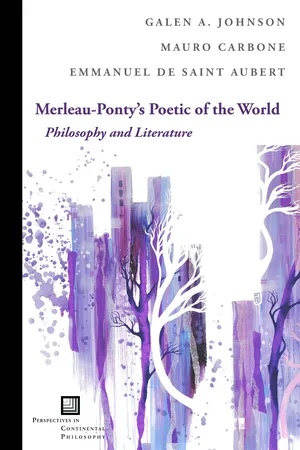
Merleau-Ponty's Poetic of the World
Philosophy and Literature
- 256 pages
- English
- ePUB (mobile friendly)
- Available on iOS & Android
Merleau-Ponty's Poetic of the World
Philosophy and Literature
About this book
Merleau-Ponty has long been known as one of the most important philosophers of aesthetics, yet most discussions of his aesthetics focus on visual art. This book corrects that balance by turning to Merleau-Ponty's extensive engagement with literature.From Proust, Merleau-Ponty developed his conception of "sensible ideas, " from Claudel, his conjoining of birth and knowledge as "co-naissance, " from Valéry came "implex" or the "animal of words" and the "chiasma of two destinies." Literature also provokes the questions of expression, metaphor, and truth and the meaning of a Merleau-Pontian poetics.The poetic of Merleau-Ponty is, the book argues, a poetic of the flesh, a poetic of mystery, and a poetic of the visible in its relation to the invisible. Ultimately, theoretical figures or "figuratives" that appear at the threshold between philosophy and literature enable the possibility of a new ontology. What is at stake is the very meaning of philosophy itself and its mode of expression.
Frequently asked questions
- Essential is ideal for learners and professionals who enjoy exploring a wide range of subjects. Access the Essential Library with 800,000+ trusted titles and best-sellers across business, personal growth, and the humanities. Includes unlimited reading time and Standard Read Aloud voice.
- Complete: Perfect for advanced learners and researchers needing full, unrestricted access. Unlock 1.4M+ books across hundreds of subjects, including academic and specialized titles. The Complete Plan also includes advanced features like Premium Read Aloud and Research Assistant.
Please note we cannot support devices running on iOS 13 and Android 7 or earlier. Learn more about using the app.
Information
PART I
Merleau-Ponty’s Poets
1
“The Proustian Corporeity” and “The True Hawthorns”
It is there that I have lived in calm voluptuousness,In the center of the blue, amidst the waves and splendors.—Charles Baudelaire, Previous Existence
The work of a great novelist always rests on two or three philosophical ideas. For … Proust, [these are] the way the past is involved in the present and the presence of times gone by. The function of the novelist is not to state these ideas thematically but to make them exist for us in the way that things exist.… It is nonetheless surprising that, when writers do take a deliberate interest in philosophy, they have such difficulty in recognizing their affinities.… Proust sometimes translates his intuition about time into a relativistic and skeptical philosophy and at other times into hopes of immortality which distort it just as much.… For a long time it looked as if philosophy and literature not only had different ways of saying things but had different objects as well. Since the end of the 19th century, however, the ties between them have been getting closer and closer. (SNS, 34–35/26–27)
“The Function of the Body in Memory”
when I awoke like this, and my mind struggled in an unsuccessful attempt to discover where I was, everything revolved around me through the darkness: things, places, years. My body, still too heavy with sleep to move, would endeavor to construe from the pattern of its tiredness the position of its various limbs, in order to deduce therefrom the direction of the wall, the location of the furniture, to piece together and give a name to the house in which it lay. Its memory, the composite memory of its ribs, its knees, its shoulder-blades, offered it a series of rooms in which it had at one time or another slept, while the unseen walls, shifting and adapting themselves to the shape of each successive room that it remembered, whirled round it in the dark.… My body, the side upon which I was lying, faithful guardians of a past which my mind should never have forgotten, brought back before my eyes the glimmering flame of the night-light in its urn-shaped bowl of Bohemian glass that hung by chains from the ceiling, and the chimney-piece of Siena marble in my bedroom at Combray, in my grandparents’ house, in those far distant days which at this moment I imagined to be in the present without being able to picture them exactly. (PhP, 211n1/530n11)1
Husserl distinguishes between act intentionality—which is the intentionality of our judgments and of our voluntary decisions …—and operative intentionality (fungierende Intentionalität), the intentionality that establishes the natural and pre-predicative unity of the world and of our life, the intentionality that appears in our desires, our evaluations, and our landscape more clearly than it does in objective knowledge. (PhP, XIII/xxxii)
When I uncover the concrete origin of the memory, this is because it again takes its place in a certain current of worry and hope that runs from Munich to the war, because I rejoin lost time, because, from the moment at issue right up until my present, the chain of retentions and the interlinking of successive horizons assures a continuous passage. (PhP, 478/441; my emphasis)6
recurs with a particular predilection to the body parts, and does not cease to evoke the images of memory that are thereby gathered, showing how, without obeying to any sign of whatever consciousness, such images immediately impose themselves on consciousness itself, as soon as a sleeper’s thigh, arm, or scapula involuntarily regains the position it had before. The involuntary memory of body parts is one of Proust’s favorite topics.9
Table of contents
- Cover
- Half Title
- Series Page
- Title Page
- Copyright
- Contents
- Preface
- Abbreviations of Works by Maurice Merleau-Ponty and Other Writers
- Half Title
- Introduction
- Part I: Merleau-Ponty’s Poets
- Part II: Merleau-Ponty’s Poetics
- Acknowledgments
- Notes
- Index
- About the Authors
- Series List